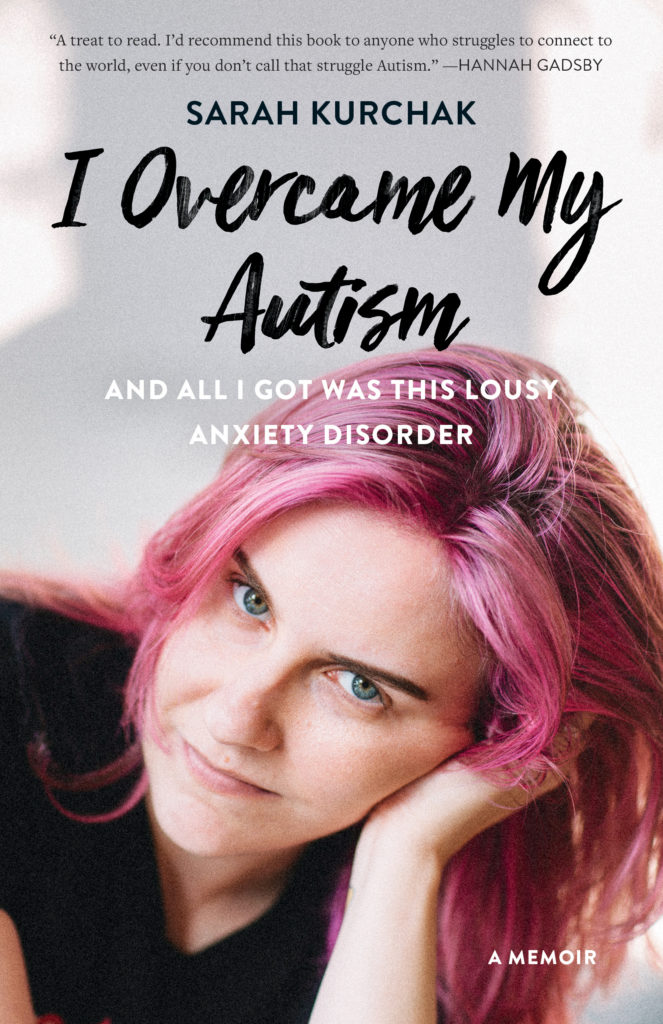By Wanda Deschamps, April 28, 2020
I Overcame My Autism: And All I Got Was This Lousy Anxiety Disorder, Sarah Kurchak, Douglas & McIntyre, April 1, 2020, 240 pp., $24.95
Sarah Kurchak’s first book I Overcame My Autism: And All I Got Was This Lousy Anxiety Disorder is as piercing, intriguing and witty as the title.
By publishing her memoir, Sarah sets herself apart within the autistic community and its allies.
Not surprisingly, then, she opens with a disclaimer setting parameters for what can realistically be expected from her as a result of this accomplishment:
“I do not speak for all autistic people. I will not try to. I do not want to. I wish to be a voice/face of autism in a much greater, more nuanced and diverse conversation, not the voice or face of autism.”
And a voice she is–biting, humorous, insightful and candid. She bills her book as an “anti-instruction guide” with chapters labelled “fifteen uneasy steps to an autistic ‘success’ story.”
The quotes around ‘success’ are ironic. Throughout her life, Kurchak conformed her social and physical behaviors in various ways to gain acceptance, escape the pain of bullying and rejection, and have a chance at a life viewed as desirable.
Despite the ensuing collateral damage of anxiety, depression and self-loathing, she has achieved ‘success’, at least outwardly. She is a professional writer and lives with her spouse in Toronto. Undiagnosed until her late 20s, she allows us to forget she did all this with autism.
Kurchak argues that it might be much more effective and, practically speaking, less expensive for our society to set a goal for everyone to be accepted for their own unique abilities, and recognized for their own potential, in order to contribute to their own optimum, on their own timeline. She poses a series of what if questions to herself during a period of deep reflection recounted in the section named Burn Out.
“What was society getting out of my prohibitively expensive contributions? As far as I could tell, I had sacrificed most of my mental health and a touch of my physical health on the altar of society. All that society was getting out of it was one chronically anxious and depressed half person who had overthought everything…”
Augmenting Kurchak’s bluntly evocative life chronicle (including becoming a professional pillow fighter) is material from recognized researchers and resources in autism and related areas, including the work of Dr. Francine Russo and Spectrum.
The research provides the background to enable greater understanding of Kurchak’s unique characteristics within a wider context and acts as a channel for the reader to learn about autism as an identity and a neurology. Kurchak offers a balanced view on autism research and need to expand it. She makes this particularly evident when exploring a well-known behavior among those with autism called masking.
As Kurchak describes it, masking is an “effort to camouflage any obvious signs of our autism… It is another under-examined aspect of autistic experience. Studies on the topic are in their infancy, and the scope of the research is far from optimal. They have yet to meaningfully address important factors, like race, class and gender.”
Kurchak’s book is a tremendous opportunity to learn more about autism. And now that society is finally undergoing its long overdue reckoning that diversity and inclusion are desirable, and necessary, autism is moving further into the public conscience.”
Increased focus on April 2nd as World Autism Awareness Day (as part of World Autism Awareness Month) is one sign of progress for autism as a force within the 21st century inclusion revolution. Perspectives from the lived experience are vital for continuous progress and, fortunately, there is more interest in stories from members of our neurodiverse population, including autistics.
Given this opportune timing, Sarah’s book has a lot to offer, both as an informative and enjoyable read for those wishing to increase their fluency about the autistic experience and for those wanting to take the time to understand the struggles of a neurotypical existence.
For the wider audience, it’s a unique contemporary memoir about growing up and coming of age.
I am optimistic about the level of interest in Kurchak’s book, now and in the longer-term, and genuinely encouraged by her arrival on the landscape as an openly autistic writer, skilled at and determined to be a perceptive trail blazar with a razor-sharp sense of humour.
Here’s to the inclusion revolution!
(Wanda Deschamps has had a twenty-five year career in the philanthropic sector and is currently founder and principal Liberty Co , a consultancy helping to advance meaningful social causes by forming partnerships with organizations and individuals.)
